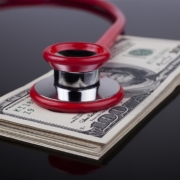Investors Plan To Put More Money Into Healthcare
The I-word, inflation, is bad enough. But then there’s the R-word: recession. And some forecasters see the potential coming forward, according to the latest CNBC Fed Survey.
Not that it’s a given, but the trifecta of inflation, more hawkish Fed monetary policy, and issues coming out of Russia’s invasion of Ukraine have increased the bet to a 33% chance of one in the next 12 months.
That may be what a new CBRE survey picked up on. Distributed to “approximately 500 of healthcare real estate’s most influential healthcare real estate trusts (REITs), institutional healthcare investors, private capital investors, and developers throughout the United States” and responses coming from about a fifth of them, 85% believed that the healthcare real estate industry is “recession resistant.”
“Survey results suggest a very significant increase in capital allocated to healthcare real estate for 2022,” the report said. “In 2021, the total capital allocation provided by respondents in our survey was $10.9 billion, while actual transaction volume for 2021 ended at nearly $16 billion. This year, the total capital allocation from those unique firms who provided a figure (65 out of 86 firms) totaled $17.1 billion, which represents a 57% increase compared to 2021.”
This year, the firms that gave a capital allocation reported $17.1 billion going into 2022, a 57% increase. Given that, CBRE expects investors to allocate at least $25 billion in capital to the sector. Market caps are likely to drop with the capitol going in, and 96% of respondents expected cap rates on Class A on-campus to be below 6% this year, while 79% anticipate the average cap rate will drop below 5.5%.
“This can be ascribed to the ongoing increase in demand for high-quality healthcare real estate, the resiliency of healthcare real estate during the pandemic, and new funding sources actively exploring alternatives to traditional real estate products, such as office, industrial, multifamily and retail,” the report reads.
Similarly, the life science sector is also tremendously strong, with record level venture funding of $32.5 billion in 2021 and in 2022 40% of respondents thinking that life sciences properties, especially those housing biotech or pharma, should see a cap rate below 5%.
As might be expected from these numbers, a big majority—84%—plan to be net buyers of healthcare real estate, including all healthcare REITs and institutional investors that responded. Only 26% of current owners will be net sellers. With that much demand and low interest in dropping net ownership, that describes a coming challenge to obtain additional properties, meaning likely higher prices.
Source: GlobeSt.










